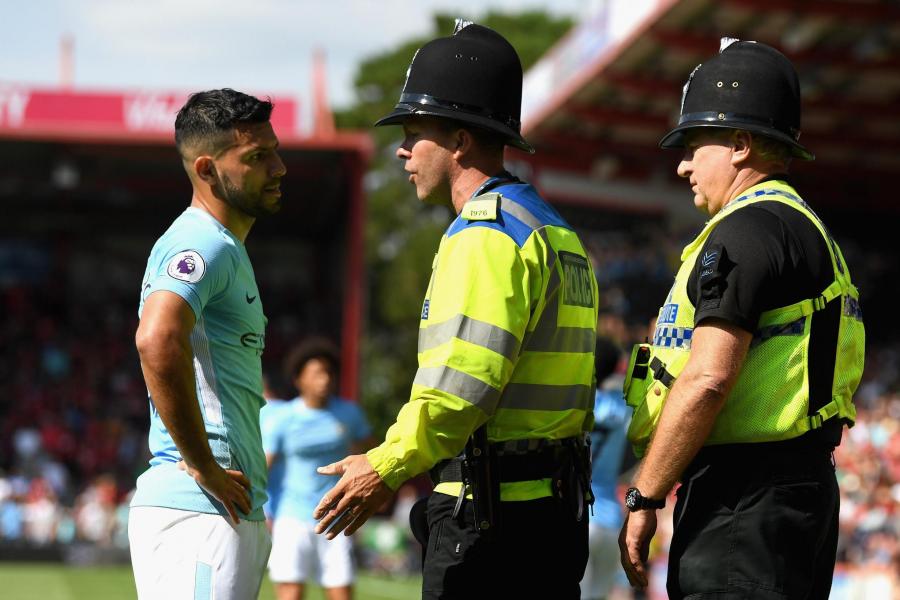London – The outcry against the treatment of Manchester City fans at Bournemouth is a reminder – heavy-handed police and stewards should be shown the red card, writes Nick Glynn in the Guardian Sport.
It’s great. Your football team scores, first minute, last minute, last minute of injury time, any time. There are 30 seconds of ecstasy, exuberance, jumping around, hugging people you would never hug anywhere else. It is accompanied by smiles, laughter, singing.
For 99.99 percent of football fans, violence could not be further from their minds. Goals are rare in football – I am a lifelong Birmingham City fan, I know this. This is not rugby, or cricket, or tennis, where players score with dreary repetition. This is football, where you can watch a brilliant 90-minute game where there isn’t a single goal.
I remember shaking the hand of a Millwall fan when they beat Leicester away with an 87th-minute goal and saying to him “It’s the best feeling in the world”. He was shocked, expecting me as the police bronze commander for the match to have some sort of action taken against him. Decades earlier I remember rescuing one of my colleagues from the Coventry pen in the Spion Kop at Leicester, as he tried to stop their fans singing George and John’s Sky Blue Army, like singing was some sort of dangerous pastime.
There has been an outcry about the recent treatment of Manchester City fans (and Sergio Agüero) at Bournemouth on August 26 – after Raheem Sterling scored a 97th-minute winner. To be clear, pitch invasions are wrong, but there is a difference between a pitch invasion and joyful celebrations momentarily spilling over the white line and on to the turf – and that is where a bit of common sense is needed.
It is always interesting to watch the reaction of stewards and police officers when a goal is scored. I see fear, anger, aggression, sometimes panic. For many, it seems the overriding desire is to stop a perfectly normal and natural human reaction to a rare event, rather than taking a few steps back, a few deep breaths, remaining calm, and observing and giving half a minute for things to calm down.
And the crowd almost always will calm down, especially where the situation isn’t aggravated by stewards and police officers diving in and unnecessarily intervening. When players go to their own fans to celebrate, don’t worry – there’s nothing to worry about. The fans will be safely back in their seats in a minute, and the players will be getting on with the game.
The reaction of stewards and police officers to goal celebrations is symptomatic of a wider problem with the rules and regulations that govern football fans, and the way that authorities treat them as a group. Many regulations apply only to football fans, and please, don’t try to claim we all deserve it. We don’t.
The Football (Offenses) Act 1991 was written in the flawed and biased times after the Hillsborough disaster, when the public were conned by a tabloid newspaper’s lying headlines and the perception supported by politicians of the time that all football fans were “scum”, capable of urinating on dying fans.
Those lies are perpetuated in the Football (Offenses) Act and the underlying sentiment of dislike and suspicion of football fans is preserved in its use by the police and stewards across the country. We’re all hooligans, deep down, goes the thinking.
Some of the laws that govern football are ridiculous. The rules on pitch encroachment are too broad. We want to prevent pitch invasions, not criminalize and throttle someone who steps over a line by a few centimeters while celebrating.
Throwing coins can blind someone or cause other serious injury. If the individuals who throw coins can be identified, I welcome the full force of the law being used. Technically, within the “missile throwing” provisions, throwing the match ball back on to the pitch can be a criminal offense. So can throwing the ball to the kid who desperately wants to be the one who throws the ball back on to the pitch. Simply drinking alcohol in sight of the pitch is a criminal offense. The rules are outdated and ridiculous.
Now that the Hillsborough victims and their families are finally on their way to seeing real justice, and trials of safe standing are finally on the cards – at last – a review of the Football (Offenses) Act and other relevant rules and regulations that cover football is long overdue. Inconsistencies in how football is policed and stewarded cannot continue. It is time for an independent, national review.
As for headlocks – as suffered by the fan on the pitch at Bournemouth last weekend, who Agüero seemed so keen to help – there is no need for a review or new laws. Section 3 of the Criminal Law Act 1967 makes it clear that force used by the police, and anyone else, including football stewards, must be reasonable in the circumstances. Force has to be proportionate to the threat being dealt with.
Headlocks are not outlawed (any use of force could be reasonable in the right circumstances), but the only circumstances that could justify use of a headlock are where the violence or risk being averted is so serious that causing death or really serious injury to the “assailant” would be justified.
Make no mistake, headlocks can kill. Therefore justification for their use is rare. A simple reminder of that fact to police officers and football stewards might be enough to avert an easily avoided tragedy.
*Nick Glynn is a retired senior police officer. He is an expert witness on police use of force, and was a football commander and adviser for nearly two decades.
The Guardian Sport
